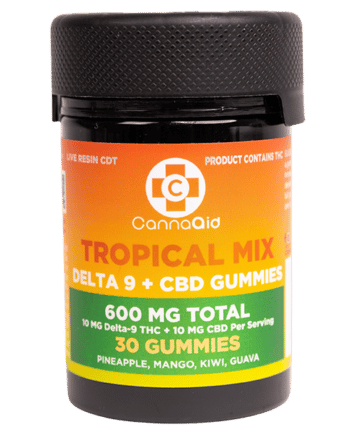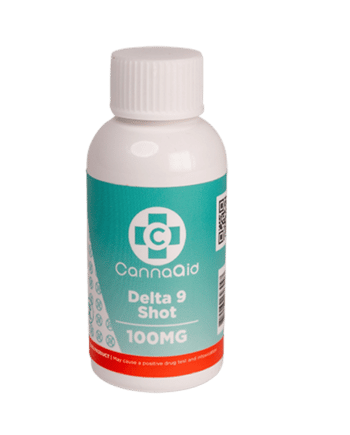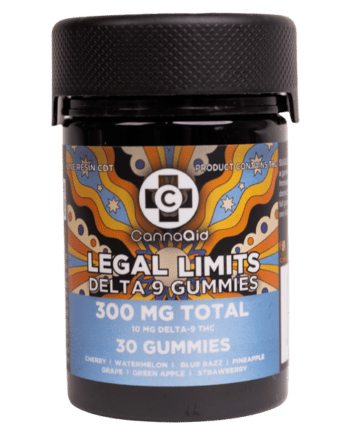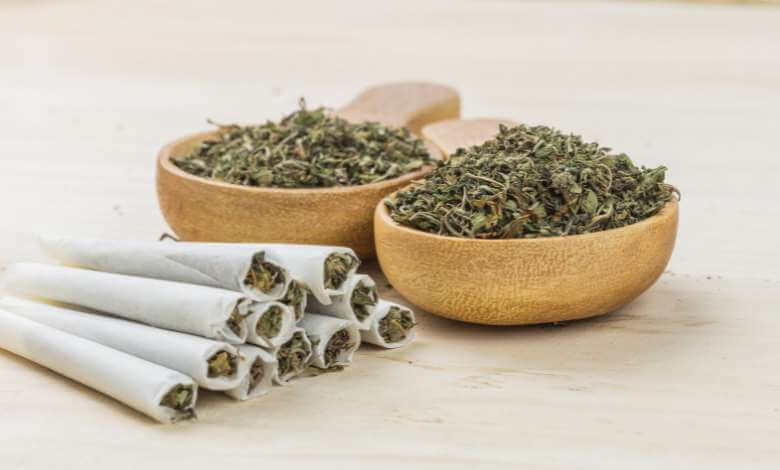You are not the only one asking, “Is Delta 9 real weed?” The discussion around whether or not Delta 9 is considered to be real cannabis is one of the most prevalent controversies that arise in the realm of THC. This is because Delta 9 is quickly becoming the most popular cannabinoid in the world today.
The landscape surrounding cannabis has dramatically shifted since the enactment of the 2018 Farm Bill, which ushered in an era where hemp and cannabinoid-based products could be legally sold alongside CBD without requiring a license akin to medicinal cannabis. With these regulatory changes, a host of new terminology has emerged, including phrases like delta 9, vaping pens, and extracts, expanding the market but also potentially complicating understanding for the uninitiated. In addition to that, the article provides extensive information regarding Delta 9 THC. Join us now on this ride down the road of Delta 9!
-
 Delta 9 + CBD Gummies$4.99 – $25.99
Delta 9 + CBD Gummies$4.99 – $25.99 -
 Delta 9 THC Shot 100mg – 55ML$9.99
Delta 9 THC Shot 100mg – 55ML$9.99 -
 Delta 9 THC Gummies – Tropical Mix$4.99 – $34.99
Delta 9 THC Gummies – Tropical Mix$4.99 – $34.99
Table of Contents:
- Key Takeaways
- What is Delta 9 THC?
- History of THC
- How Does Delta 9 THC Work?
- A Comparison of Delta 9 and Delta 8
- Comparing and Contrasting Delta 8 and Delta 9
- Is Delta 9 Real Weed?
- A Delta-9 Perspective
- Options For Enjoying Delta 9 THC
- Exploring Each Method
- Where to Buy Delta 9 Near Me
- Conclusion
Key Takeaways
Hemp and cannabis both contain delta 9 THC, one of the main ingredients. This compound is the primary psychoactive element found in the plant.
Products that contain less than 0.3% of their total dry weight are deemed compliant with the Farm Bill and are permitted to be sold at the federal level, even though this is illegal.
Delta 9 THC is the identical compound responsible for the euphoric effects associated with traditional cannabis. There is a distinction between hemp and other products based on their source and amount of extract.
Though opinions may differ, everyday cannabis products like edibles, vaping pens, and tinctures contain Delta 9 derived from hemp.
What is Delta 9 THC?
Alright, guys, let’s begin with an introduction to cannabinoids. Today, we’ll be talking about Delta 9 THC, also known as D9, which is the most prevalent phytocannabinoid found in the cannabis plant. This compound, also referred to as Delta-9-Tetrahydrocannabinol, is one of the six most common chemicals derived from cannabis, alongside CBD.
This compound is also known as THC, the primary psychoactive compound found in cannabis. This particular cannabinoid is responsible for inducing psychoactive effects, along with a multitude of other effects that occur upon its interaction with our endocannabinoid system.
Delta 9 THC’s distinct pharmacology allows it to attach to the endocannabinoid system’s CB1 receptor proteins. It is also part of our nervous system, which communicates all types of sensory feelings in the body.
It is noteworthy to mention that this specific type of cannabinoid is prohibited by federal law. While some states have made progress in implementing licenses and allowing the use of medicinal cannabis, many states still have restrictions on Delta 9.
Rest assured, however, that thanks to the 2018 Farm Bill, it is now permissible to produce and market hemp-derived products as long as they contain less than 0.3% THC. Producers have managed to work around this restriction by incorporating extract into edibles and including other cannabinoids. This clever approach ensures that Delta 9 THC products can still be offered in the market while adhering to the law.
History of THC
When delving into the historical narrative of THC, one pivotal aspect to consider is the attribution of its discovery. Dr. Raphael Mechoulam is commonly credited with the discovery of THC and is often referred to as the pioneering figure in cannabis science. Working alongside Yechiel Gaoni, they are recognized for isolating and elucidating the structure of THC.
Prior to this groundbreaking discovery, Dr. Mechoulam had already conducted extensive research on cannabis and cannabinoids, laying the groundwork for his subsequent identification of THC. While Dr. Mechoulam’s contributions to THC research are significant, it’s noteworthy to mention Roger Adams, a chemist from Harvard, who was the initial individual to identify THC and explore its relationship with CBD.
The 1960s witnessed a surge in recreational cannabis use, paralleled by a growing interest in THC research. This era saw an escalation in inquiries surrounding the physiological mechanisms of THC within the human body, reflecting the burgeoning curiosity surrounding its effects and potential applications.
-
 Delta 9 + CBD Gummies$4.99 – $25.99
Delta 9 + CBD Gummies$4.99 – $25.99 -
 Delta 9 THC Shot 100mg – 55ML$9.99
Delta 9 THC Shot 100mg – 55ML$9.99 -
 Delta 9 THC Gummies – Tropical Mix$4.99 – $34.99
Delta 9 THC Gummies – Tropical Mix$4.99 – $34.99
How Does Delta 9 THC Work?
It is well known for the intoxicating effects that Delta 9 THC has on the human body, and it accomplishes this by connecting with cannabinoid receptors in the neurological system and the brain. When it does, the body can experience strong psychoactive effects from it.
In addition, the high effects of THC may only persist for a few hours, while the cannabinoid stays in the body for a longer period of time. At this time, it is stored in the fats of the body, as well as in the organs and hair follicles. This is the reason why THC can be detected in consumers of drugs several weeks after they have used the substance. An example of this would be the presence of THC in hair follicles approximately ninety days after use.
In light of this, science has made it much simpler to comprehend how THC exerts its effects on the body. On the other hand, another important question that consumers have concerns the safety and risks associated with consuming this cannabinoid, which we will go over in the following paragraphs.
A Comparison of Delta 9 and Delta 8
Introducing one of the prominent players in the current hemp landscape: delta 8 THC, a significant hemp-derived cannabinoid. This compound stands out as an isomer of delta 9 THC, sharing a similar chemical structure but with a distinguishing carbon linkage.
In essence, delta-9 THC possesses an additional atom in its molecular makeup, contributing to its pronounced psychoactive effects upon consumption. Conversely, delta 8 THC exhibits a distinct structure that leads to a notably milder psychoactive experience, often likened to a euphoric sensation reminiscent of sativa strains.
A notable disparity between the two lies in their regulatory status. While delta 9 THC is subject to stringent restrictions, typically capped at levels below 0.3% of a product’s dry weight, delta 8 THC enjoys greater accessibility across various product formats.
Delta 8 THC offers versatility in consumption, ranging from microdoses of 5 to 10mg to standard doses starting at 25mg and even potent doses reaching up to 300mg per edible. In contrast to delta 9 THC products, delta 8 variants may appear more subdued in smaller quantities, making them suitable for those seeking a manageable daytime experience without overwhelming fatigue.
On another front, hemp-derived delta 9 THC holds the potential to address ailments, particularly when complemented by other advantageous cannabinoids like CBD or CBN.
The decision between delta 8 and delta 9 THC ultimately comes down to personal tastes and the desired effects, with dosage levels being easily adjusted in accordance. Before investigating these cannabinoids for possible wellness benefits, it is advisable to speak with a healthcare provider.
Comparing and Contrasting Delta 8 and Delta 9
Delta 8 and Delta 9 cannabinoids share similarities and differences. Both affect the body’s cannabinoid receptors, causing intoxication and similar effects. But while Delta 9 is abundant naturally in cannabis plants, Delta 8 is usually synthesized from CBD. Compared to Delta 8, Delta 9 has more psychoactive effects and adverse effects. Additionally, Delta 9 has been researched more extensively over the past 60 years, while Delta 8 research remains limited.
Is Delta 9 Real Weed?
Yes, Delta 9 THC is real weed. Although this is framed in a rather misguided manner, we believe that Delta 9 THC might be regarded as a legitimate kind of marijuana. It is possible to get high from a delta 9 THC gummy, despite the fact that it does not have the same sensation as flowers or buds due to the concentration that is required for goods.
This occurs due to the fact that delta-9 THC is the major cannabinoid that causes you to feel high whenever you take a puff or a few bites off of an old brownie. One of the most important distinctions between Delta 9 vs regular THC is the concentration that is utilized to ensure compliance with the legal framework established by the Farm Bill of 2018.
But the fact of the matter is that, from a chemical standpoint, they are the same compound. What’s the difference between Delta 9 and weed, if any? Some users have reported that the experience of using hemp with delta-9 THC may feel even more intense. This is attributed to the fact that full-spectrum delta 9 formulations include other cannabinoids, which can enhance the overall experience.
It is possible for certain chemicals, such as delta 8 THC or CBD, to alleviate some of the negative symptoms that are associated with “regular” THC.
A Delta-9 Perspective
The subject of “Is Delta-9 real weed?” is discussed in a number of threads on Reddit, particularly those that focus on the legal implications. Users have questioned whether or not the consumption of Delta 9, particularly Delta 9 derived from hemp, is lawful in comparison to common marijuana or “real weed.”
Is Delta 9 real, or is it just a misconception? There is a back-and-forth between the claims, with some arguing that Delta 9 generated from hemp is lawful, while others argue that the reason why some Delta 9 edibles might be allowed is because they contain less than 0.3% Delta 9 THC, as required by the Farm Bill of 2018.
In conclusion, as we mentioned before, it is a challenging question that involves both technical and practical considerations.
Options For Enjoying Delta 9 THC
Similar to other hemp-derived cannabinoids, there are various ways to experience delta 9 THC. Although not as widely available as medical cannabis in flower or extract forms, regions without licensing access can still partake in its effects legally.
The three primary methods for legally enjoying delta 9 THC include infused products like edibles and tinctures, as well as full spectrum vape formulas incorporating different cannabinoids.
Exploring Each Method
Edibles
Commonly known as edibles or edibles, these are cannabinoid-infused products meant for consumption. Unlike the immediate effects of vaping or burning, edibles require digestion, leading to delayed onset and prolonged effects. A single gummy, for example, can take 30 to 90 minutes to absorb, with peak effects around 2 to 3 hours and lasting up to 12 hours. Utilizing full spectrum formulas can enhance desired effects and potentially mitigate side effects, thanks to the synergistic “entourage effect” of cannabinoids. Starting with small doses is advisable, as cannabinoids interact uniquely and may enhance each other’s potential benefits.
Vape
Vaping employs a similar approach to delta 8 THC carts and pens but with limitations on delta 9 THC levels. Legal vapes often blend delta 9 THC with other cannabinoids within the 0.3% threshold, enriching the experience with compounds like CBD or delta 8 THC. Some producers even experiment with novel cannabinoid blends to create distinctive experiences akin to wine blends with different grape varieties. Pure delta 9 THC wax or shatter options are currently limited, encouraging the exploration of alternative blends or products.
Tinctures
Tinctures offer a concentrated form of hemp-derived delta 9 THC mixed with a carrier oil. Some include strain-specific terpenes for added flavor and complexity. Easily administered via a dropper, tinctures can be taken sublingually or incorporated into beverages, foods, or cooking. Effects typically manifest within 15 to 30 minutes, lasting between 6 to 8 hours, making them a middle ground between vaping and edibles in potency and duration.
In summary, while Delta 9 THC presents various consumption options, each method offers Is Delta 9 real, or is it just a misconception? Distinct onset times, durations, and nuances in effects allow users to tailor their experience based on preferences and desired outcomes.
Where to Buy Delta 9 Near Me
Finding reliable sources is essential to guaranteeing the quality and safety of Delta 9 products when making purchases. Look no further than CannaAid, one of the leading online shops specializing in all things hemp and hemp-derived Delta 9. With a reputation for offering premium, lab-tested products, CannaAid provides a diverse range of options, including Delta 9 Gummies, THC Shots, Disposable Vapes, and Chocolates. Each product is accompanied by Certificates of Analysis (COAs), guaranteeing their potency and purity, so you can shop with confidence knowing you’re getting the highest quality Delta 9 products available.
Whether you’re seeking a convenient way to enjoy Delta 9 on the go with disposable vapes or indulging in delicious Delta 9-infused chocolates, CannaAid has you covered with a selection curated to meet diverse preferences and needs. With a commitment to transparency and customer satisfaction, CannaAid stands out as a reliable destination for Delta 9 enthusiasts, offering a seamless shopping experience and top-notch products that deliver the desired effects safely and reliably.
Conclusion
In conclusion, the question of whether Delta 9 is the same as weed is a complex one, reflecting the evolving landscape of cannabis legality and terminology. While Delta 9 THC shares chemical similarities with traditional cannabis, its concentration and sourcing often differ due to regulatory constraints. However, users can still experience the psychoactive effects associated with cannabis through Delta 9 products, which are now legally available thanks to the 2018 Farm Bill.
As you navigate the world of Delta 9 THC, it’s essential to prioritize safety and quality when sourcing products. Look no further than CannaAid, a trusted online retailer specializing in hemp and Delta 9 products. With a commitment to transparency and excellence, CannaAid offers a diverse range of Delta 9-infused options, from edibles to vapes, ensuring you can enjoy the potential benefits of Delta 9 THC with confidence. Explore their selection today and embark on a journey to discover the potential of Delta 9 THC for yourself.
Have more queries about Delta 9? Check out our Delta 9 blog section, or contact us via our contact form; call us at 704-275-8715 or email us at [email protected] to clarify your doubts. We will be pleased to help you, as our knowledgeable support staff will do.

